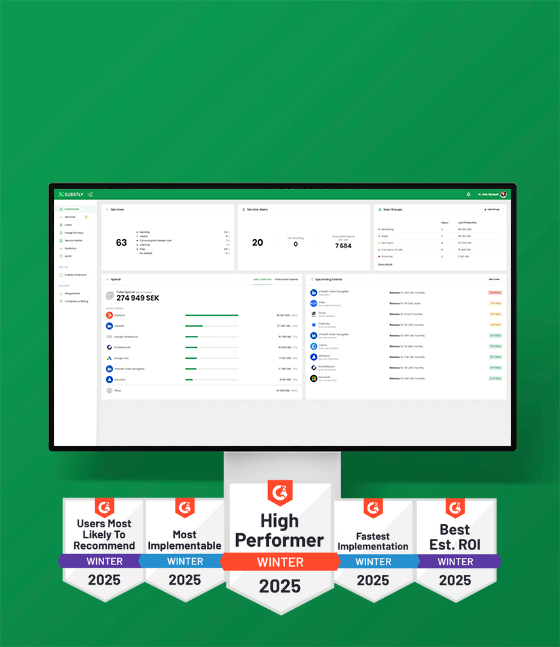Table of Contents
Seamless SaaS Management and Organizational Success
Challenges Faced in the SaaS Era
The Birth of SaaSOps and Its Philosophy
The Role of SaaS Ops Teams
Why CIOs Need a SaaS Ops Team
SaaSOps Practices and SaaS Operations Management Software
Fundamental Skills for SaaS Operations Professionals
Key Takeaways
- IT teams face challenges like manual management tasks, security risks, application proliferation, and license optimization. SaaSOps provides a framework to tackle these issues efficiently and gain full control.
- SaaSOps professionals play a crucial role in managing, securing, and optimizing SaaS tools. Their responsibilities include SaaS discovery, management, security, onboarding, offboarding, and ensuring compliance with industry guidelines.
- Businesses need a SaaS Management Platform (SMP) to implement SaaS Operations practices effectively. An SMP allows companies to discover, manage, and secure multiple SaaS tools from a central admin dashboard, streamlining operations and improving efficiency.
- SaaSOps ensure employees can leverage SaaS tools effectively, foster cross-functional collaboration, enhance security, and provide a competitive business advantage. Companies with SaaSOps practices in place experience up to 50% more employee productivity.
Seamless SaaS Management and Organizational Success
In the modern digital landscape, Software-as-a-Service (SaaS) has become increasingly prevalent, and SaaS Operations (SaaSOps) is integral to managing the ever-growing world of SaaS applications. With a focus on discovery, management, and security, SaaSOps professionals play a pivotal role in optimizing SaaS usage.
In a world where SaaS is the new norm, SaaSOps professionals are the architects of seamless digital experiences and the guardians of organizational success. Embracing the right skills, a SaaS Management Platform, and a dedicated SaaS Ops team, businesses can navigate the challenges of the digital workplace, enhance productivity, and ensure data security and compliance through modern SaaS management.
This article delves into the world of SaaS Operations (SaaSOps), exploring its definition, evolution, and critical role in managing, securing, and optimizing SaaS apps.
The Emergence of SaaSOps
SaaSOps, short for SaaS Operations, originated in response to the explosive growth of SaaS tools usage in the workplace. With an ever-growing stack of SaaS tools utilized, IT teams face numerous challenges, such as manual management tasks, security risks, and redundant application adoption. SaaSOps offers a framework for IT teams to navigate the complexities of efficiently managing a rapidly growing SaaS stack.
The Evolution of SaaS and Its Impact
The rise of SaaS apps in the average company has transformed how businesses operate. Traditionally, organizations installed software on individual computers, leading to challenges such as high costs, maintenance, and limited accessibility.
SaaS revolutionized the software landscape by providing on-demand access to applications via the internet. This paradigm shift enabled businesses to scale efficiently, reduce upfront costs, and increase collaboration. However, the rapid adoption of multiple SaaS tools also introduced new challenges.
Challenges Faced in the SaaS Era
As businesses embrace a plethora of SaaS applications, they encounter a range of challenges that require specialized management. Some of the key challenges include:
- Application Proliferation: With the ease of SaaS adoption, different departments or cost centers may independently select and adopt similar applications, leading to redundancy and inefficiency.
- Manual Management Tasks: Managing SaaS apps demands extensive manual work, such as provisioning and de-provisioning accounts, which can burden IT teams.
- Security Risks: The use of unsanctioned SaaS apps can pose significant security threats and data breaches.
- License Optimization: Inefficient access management of SaaS licenses can result in active subscriptions long after employees depart, leading to unnecessary expenses.
The Birth of SaaSOps and Its Philosophy
As SaaS adoption proliferated, the need for a framework to address the challenges became evident. SaaSOps represent more than just optimizing spend with SaaS vendors; it encompasses new processes, skills, and responsibilities in today’s digital workplace.
The philosophy of SaaSOps revolves around reducing friction, improving collaboration, and providing a better employee experience. It empowers businesses to navigate the ever-changing SaaS landscape efficiently, ensuring businesses derive maximum value from their SaaS investments.
The Role of SaaS Ops Teams
SaaSOps professionals play a pivotal role in managing, securing, and optimizing SaaS applications on a daily basis. Their responsibilities encompass several critical areas:
SaaS Discovery
SaaS Ops teams must gain visibility into employees' app usage, allowing them to consolidate apps, enhance collaboration, and optimize spending. SaaS Ops Teams enhance security and compliance by identifying unsanctioned apps and removing access to risky applications.
SaaS Management
With the help of streamlined SaaS Operations practices and SaaS management platforms, the elimination of manual IT work can cut up to 75% of the time spent on common IT tasks such as license handling and budgeting. This reduces complexity and improves operational efficiency while providing better visibility and control over the SaaS environment.
Automation of SaaS management holds immense potential to streamline processes and maximize the efficiency of the SaaS stack. However, SMBs face unique challenges that require a tailored approach to automation. By acknowledging the limitations of their resources, assessing vendor compatibility, and addressing integration complexities, SMBs can find the right balance between manual and automated SaaS management.
SaaS Security & Compliance
SaaS Ops teams are responsible for securing company SaaS data and ensuring regulatory compliance. Swiftly identifying potential threats, automating threat remediation, and implementing a least privilege access model with unified roles and permissions are essential to safeguarding data.
Why CIOs Need a SaaS Ops Team
A dedicated SaaS Ops team is essential as the workplace increasingly relies on SaaS apps, especially in large enterprises. A SaaS Ops team helps employees leverage these tools effectively, encourages cross-functional collaboration, enhances data security, and ensures a competitive business advantage. With SaaSOps practices in place, organizations can witness up to 50% more employee productivity, making it a critical component of modern IT management.
In small and midsized companies, the constrained budget frequently hinders the possibility of hiring a SaaS Ops team. Consequently, it becomes even more crucial to adopt efficient SaaS Operation practices and SaaS management platforms tailored for SMEs, as there is limited manpower available to handle a substantial workload.
SaaSOps Practices and SaaS Operations Management Software
To effectively implement SaaS Operations practices, SaaSOps engineers require a SaaS Operations Management software, often called SaaS Management Platform (SMP). Gartner defined SMPs as "stand-alone tools that can discover, manage, and secure multiple SaaS applications from a central admin dashboard, delivered as a turnkey service."
SaaS Operations Management software plays a critical role in streamlining the management of SaaS applications. By offering centralized control, improved security, cost optimization, performance monitoring, and user lifecycle management, these tools empower IT teams to efficiently manage their SaaS stack and deliver a seamless experience to end-users. As businesses continue to embrace the SaaS model, investing in robust SaaS Operations Management software becomes a strategic necessity to stay ahead in today's competitive digital landscape.
Roles and Responsibilities in SaaSOps
With the rise of SaaSOps, IT professionals have embraced new job titles and responsibilities to align with this evolving field. Job titles such as SaaS Operations (SaaSOps) Supervisor, VP of SaaS Operations, SaaS Operations Engineer, and SaaS Operations Lead have become increasingly common in large enterprises. These roles involve tasks such as researching and recommending SaaS for organizational use, managing employee access to SaaS tools, onboarding, and offboarding employees, and ensuring the protection of sensitive company data.
The Importance of SaaSOps in Optimizing SaaS Usage
The world of SaaS continues to evolve, and the role of SaaSOps professionals is becoming more critical than ever. Efficiently managing, securing, and optimizing SaaS applications boosts productivity and helps businesses stay competitive and agile in today's fast-paced business landscape. By understanding the challenges and responsibilities of SaaSOps, individuals can pursue rewarding careers in this dynamic and vital field.
Fundamental Skills for SaaS Operations Professionals
Companies need problem-solving, technical, analytical, and compliance-skilled professionals to succeed with SaaS Operations. The ability to resolve issues promptly, proficiency in cloud computing, server administration, coding languages, and analytical thinking are essential for successful SaaSOps management. Additionally, compliance skills are crucial to ensuring that SaaS operations align with data privacy and information security standards.
The Work Environment of SaaS Operations Teams
SaaS Operations teams generally work in a fast-paced environment, either from an office or remotely. They might fulfill their responsibilities from a computer at work and have regular office hours, working in an office space, or they may work remotely from the comfort of their homes. They might often work long hours and overtime if there is a deadline to meet. This usually depends on their workload, the companies they work for, and the duties they perform.
If you work in a small or medium-sized business and seek a SaaS management platform with a short learning curve that is user-friendly and strengthens the cooperation between IT and Business, consider exploring Substly to see if it suits your needs.
Related articles





.jpg)